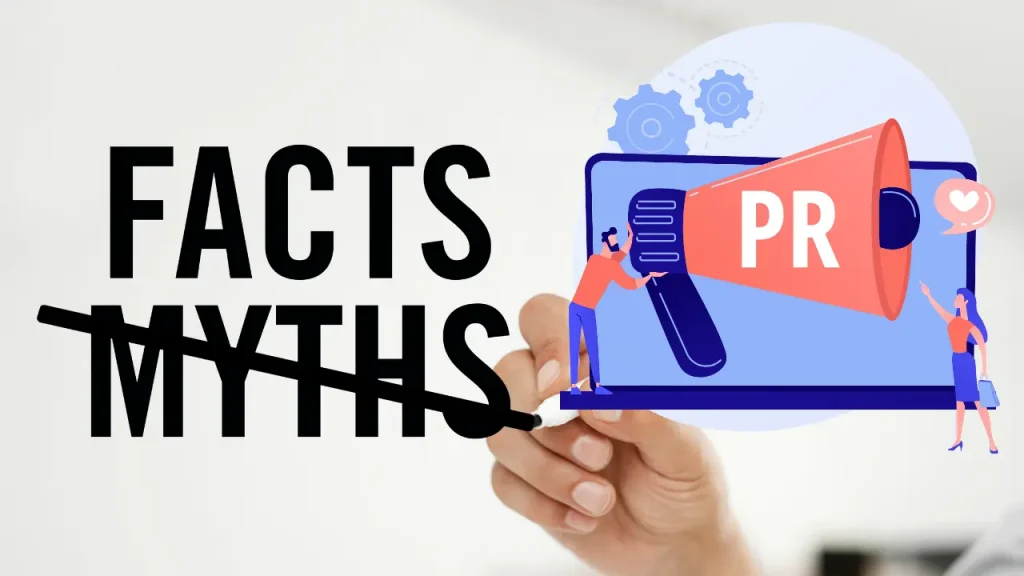Table of Contents
I. Introduction:
Starting a company is like walking a tightrope. You’ve got a brilliant idea, a passionate team, and enough hustle to power a small city. But in the vast, ever-expanding startup universe, how do you get your voice heard above the noise? How do you convince investors, customers, and the media to take notice?
If you’re feeling overwhelmed, you’re not alone. Many startups are so focused on building their product or service that they neglect a critical ingredient for success: public relations (PR). And no, we’re not talking about stuffy press releases or schmoozing with journalists at cocktail parties.
This is PR for startups, reimagined for the digital age. It’s about crafting a compelling narrative, building relationships with key influencers, and leveraging the power of earned media to amplify your message. It’s a strategic approach that can generate buzz, build credibility, and drive growth, even on a shoestring budget.
In this guide, we’re ditching the PR fluff and giving you the straight-up truth. We’ll walk you through the essential strategies and tactics that successful startups use to get noticed. We’ll share real-world examples, actionable advice, and expert insights to help you navigate the complex world of PR for startups. And we’ll show you how digital PR can be your secret weapon for achieving the kind of visibility that turns heads and opens doors.
II. Debunking the Myths of PR for Startups:

Before we dive into the nitty-gritty of PR for startups, let’s clear the air and bust some common myths that might be holding you back.
Myth #1: PR is Only for Big Brands with Deep Pockets
Think PR is just for the Apples and Googles of the world? Think again. Sure, those giants have massive PR budgets, but that doesn’t mean startups are out of the game. In fact, PR can be even more crucial for startups, as it helps them gain traction in a crowded market and establish credibility early on.
Digital PR, in particular, levels the playing field. With social media, blogs, and online publications, startups can reach a massive audience without breaking the bank. Remember, it’s not about how much you spend, but how smart you strategize.
Myth #2: PR is Just Press Releases (Yawn)
Press releases are just one tool in the PR arsenal, and frankly, they’re not always the most exciting. Digital PR for startups is about so much more than crafting a dry announcement and hoping a journalist bites.
Think creative storytelling, engaging social media campaigns, and building relationships with influencers who can amplify your message. It’s about finding innovative ways to get your brand noticed and remembered.
Myth #3: PR is Too Expensive for My Startup Budget
Ah, the budget constraints. We feel you. But here’s the good news: PR for startups doesn’t have to cost an arm and a leg. In fact, there are plenty of affordable (with us) and even free! tactics you can implement on your own.
Think social media outreach, guest blogging, and participating in industry events. It’s about being resourceful, creative, and leveraging the tools at your disposal. And if you’re willing to invest a bit more, we are specialized in working with startups on a budget.
So, there you have it. Three myths debunked, three excuses eliminated. Now it’s time to roll up your sleeves and start crafting a PR strategy that will put your startup on the map.
III. Building Your Startup’s PR Foundation:

Before you unleash your PR prowess, you need to lay a rock-solid foundation. Consider this the blueprint for your startup’s PR success.
Define Your Story:
Think of your startup as a character in a novel – what’s their origin story? What drives them? What makes them unique? Your brand story isn’t just a marketing gimmick; it’s the heart and soul of your company. It’s what sets you apart from the sea of competitors and makes you memorable.
Take some time to articulate your unique value proposition:
- What problem are you solving?
- How does your product or service make life easier for your customers?
- What impact are you making in your industry?
Once you’ve nailed down your story, craft a compelling narrative that will resonate with your target audience and the media.
Know Your Audience:
In the world of PR for startups, one size definitely doesn’t fit all. Your message might be music to the ears of one audience but fall flat with another. That’s why it’s crucial to identify your ideal customers and understand their needs, pain points, and media habits.
Who are they? Where do they hang out online? What kind of content do they consume? By answering these questions, you can tailor your PR messaging to speak directly to them, increasing your chances of engagement and success.
Set SMART Goals:
Don’t just aimlessly throw PR spaghetti at the wall and hope something sticks. Instead, set SMART goals that will guide your efforts and allow you to measure your progress.
- Specific: What exactly do you want to achieve with your PR for startups campaign?
- Measurable: How will you track your progress and measure your success?
- Achievable: Are your goals realistic given your resources and timeframe?
- Relevant: Do your goals align with your overall business objectives?
- Time-bound: When do you want to achieve these goals?
Setting SMART goals will help you stay focused, motivated, and accountable.
Need a Helping Hand?
At E-PR Online, we understand the unique challenges startups face in building a strong PR foundation. Our team of experts can guide you through the process, offering insights, strategies, and support to ensure your PR efforts are effective and aligned with your business goals. Let’s chat about how we can help you tell your startup’s story to the world.
IV. Essential PR Tactics for Startups:

Alright, let’s get down to the fun part: putting your startup PR plan into action. These tried-and-true tactics will help you make a splash in the digital world and attract the attention your business deserves.
Media Relations 101: The Art of the Pitch
Forget the days of mass-emailing generic press releases and hoping for the best. We have built relationships with journalists who cover your industry. Think of them as your potential partners in crime. We start by identifying relevant publications and reporters, then we craft personalized pitches that highlight the unique aspects of your startup.
Remember, journalists are busy people, so we make our pitch short, sweet, and to the point. With your help we will offer them a compelling story angle, a juicy quote from your founder, or exclusive access to your product.
The Art of Storytelling: Crafting Compelling Content
Your startup has a story to tell, so make sure it’s a good one. Whether it’s a press release announcing a new product launch or a blog post sharing industry insights, your content should be engaging, informative, and relevant to your target audience.
Don’t be afraid to inject some personality into your writing. A little humor can go a long way in making your brand memorable. And always remember to optimize your content for search engines by incorporating relevant keywords like “PR for startups” and “digital PR for startups.”
Social Media Amplification: Get Social (Strategically)
Social media is a powerful tool for amplifying your PR efforts and reaching a wider audience. But it’s not just about posting random updates or jumping on every trending hashtag. Develop a social media strategy that aligns with your overall PR goals.
Share your press releases, blog posts, and other content across your social channels. Engage with your followers by asking questions, responding to comments, and participating in relevant conversations. And don’t forget to track your social media analytics to see what’s working and what’s not.
Community Building: More Than Just Marketing
PR for startups isn’t just about getting media attention; it’s also about building a loyal community around your brand. This could involve participating in online forums, hosting events, or partnering with other businesses in your industry.
By fostering a sense of community, you’ll create brand advocates who are passionate about your product or service and eager to share their experiences with others. This kind of word-of-mouth marketing is invaluable for startups looking to grow their customer base and establish their reputation.
V. Measuring and Optimizing Your PR Efforts:

You’ve laid the groundwork for your startup’s PR strategy, crafted compelling stories, and pitched like a pro. Now comes the moment of truth: measuring the impact of your digital PR for startups efforts. But hold your horses! This isn’t about counting likes and shares just for the sake of it. It’s about understanding what’s working, what’s not, and how to optimize your strategy for maximum results.
Key Metrics to Track:
First things first: what are you measuring? Here are some essential metrics to keep an eye on:
- Website traffic: Is your PR generating buzz and bringing people to your digital doorstep?
- Media mentions: Are you getting your name out there in the publications that matter to your target audience?
- Social media engagement: Are people talking about your brand online? Are they sharing, liking, and commenting on your content?
- Brand sentiment: What’s the overall tone of the conversation around your brand? Positive, negative, or neutral?
- Lead generation: Is your PR activity translating into tangible business results, like qualified leads or demo requests?
Tools of the Trade:
You don’t need a fancy firm to track your progress. There are plenty of affordable and user-friendly tools available to help you measure the impact of your digital PR for startups campaigns.
- Google Analytics: This powerful tool provides a wealth of data on your website traffic, including referral sources, demographics, and user behavior.
- Social media analytics: Most social platforms offer built-in analytics that allow you to track engagement, reach, and impressions.
Analyzing and Adapting: The Key to Continuous Improvement
Don’t just collect data for the sake of it. Use it to refine your strategy and make informed decisions. Are certain publications driving more traffic than others? Is a particular type of content resonating more with your audience? By analyzing your data, you can identify your strengths and weaknesses and adjust your approach accordingly.
Remember, PR for startups is an ongoing process. It’s not about achieving perfection overnight, but rather about continuously learning, adapting, and improving. By tracking your results and using data to guide your decisions, you can ensure that your digital PR efforts are always moving the needle for your business.
VI. Case Studies: Startups That Nailed Their PR Game:
Let’s take a break from the theory and dive into some real-world examples of startups that have used PR as a springboard to success. These case studies illustrate the diverse ways in which PR for startups can be leveraged to achieve remarkable growth.
Buffer: The Guest Posting Powerhouse
Social media management platform Buffer didn’t just rely on its product to gain traction. Co-founder Leo Widrich spearheaded an aggressive guest posting campaign, writing over 150 articles for various blogs and publications. This strategy not only drove traffic to their website but also established Buffer as a thought leader in the social media space. The result? A staggering 100,000 users within the first nine months of launch.
Airbnb: The Experience Architects
Airbnb revolutionized the travel industry, but their early growth wasn’t just due to their innovative platform. They harnessed the power of PR for startups with creative stunts like the “Night At” campaign, offering unique stays in unexpected locations (think a night in a shark tank!). They also partnered with celebrities and influencers, leveraging their star power to generate buzz. This clever use of PR catapulted Airbnb into the mainstream, making it a household name and a global brand valued at billions.
Dropbox: The Referral and Content Kings
Dropbox, the cloud storage giant, masterfully combined PR with a viral referral program. By offering free storage space to both referrers and new users, they incentivized word-of-mouth marketing. Their simple yet effective explainer video also went viral, further fueling their growth. This multi-pronged approach led to an explosion of users, propelling Dropbox to a multi-billion dollar valuation.
Slack: The Workplace Communication Whisperer
Slack, the team collaboration tool, didn’t just launch a product; they launched a movement. Their PR strategy focused on telling a compelling story about transforming workplace communication. By targeting early adopters and tech influencers, they created a groundswell of excitement that quickly spread throughout the business world. Slack’s data-driven PR approach, which showcased the platform’s impact on productivity, further solidified its reputation as a must-have tool for modern teams.
These examples demonstrate that there’s no one-size-fits-all approach to PR for startups. The most effective strategies are those that are tailored to your brand, your audience, and your goals. But one thing is clear: when done right, PR can be a game-changer, propelling your startup to new heights of success.
VII. Conclusion:
So, there you have it – your crash course in PR for startups. It’s clear that this isn’t your grandma’s PR playbook. Digital PR for startups is a strategic game-changer, capable of propelling your brand to the forefront of your industry.
Remember, it’s not just about snazzy press releases. It’s about crafting a compelling narrative, building relationships with the right people, and leveraging data-driven insights to optimize your efforts. It’s about being scrappy, creative, and always one step ahead of the competition.
But let’s be honest, PR can be a beast to tackle on your own. If you’re feeling overwhelmed or simply want to ensure your startup gets the best PR possible, we’re here to help. Our team of seasoned PR pros specializes in crafting tailored strategies for startups, helping you achieve your goals and maximize your impact.
Ready to take your startup PR to the next level? Let’s chat. Reach out to us today for a free consultation and discover how we can turn your brand into a media darling.

FAQ: Your Burning Questions About PR for Startups, Answered
1. How much does PR cost per month for a startup?
The cost of PR for startups can vary widely depending on the scope of services, the experience of the agency, and the specific needs of your business.
- DIY Approach: If you’re bootstrapping and have limited funds, you can start with free or low-cost tactics like social media outreach, guest blogging, and networking.
- Starting package: we can offer packages starting around $2,000 – $5,000 per month.
- Larger package: For more comprehensive services and established reputations, expect to pay upwards of $10,000 per month.
Remember, PR is an investment in your brand’s future. Think of it like planting seeds – you won’t see results overnight, but with consistent effort and a well-crafted strategy, you can reap the rewards for years to come.
2. How can I get free PR for my startup?
While working with a PR agency is the most effective way to secure consistent, high-quality media coverage, there are several ways to generate PR for your startup without spending a dime:
- Build Relationships with Journalists: Connect with reporters who cover your industry and offer them exclusive stories or insights.
- Leverage Social Media: Share your company news, engage with influencers, and participate in relevant conversations.
- Create Shareable Content: Develop blog posts, infographics, or videos that are interesting and relevant to your target audience.
- Get Involved in Your Community: Sponsor local events, volunteer your time, or participate in industry forums.
3. When is the right time for a startup to invest in PR?
Ideally, PR should be integrated into your marketing strategy from the very beginning. The earlier you start building your brand reputation and establishing relationships with the media, the better. However, if you’ve already launched and are struggling to gain traction, it’s never too late to invest in PR. A well-executed PR campaign can help you re-energize your brand and reach new audiences.
4. How do I choose the right PR agency for my startup?
Choosing the right PR partner is crucial for your startup’s success. Here are a few key factors to consider:
- Industry Expertise: Look for an agency with experience in your specific industry or niche (we have it).
- Proven Track Record: Ask for case studies and testimonials from other startups they’ve worked with (we have it).
- Communication and Transparency: Ensure the agency is communicative, transparent, and willing to work collaboratively with you (we provide it).
- Budget and Services: Make sure the agency’s pricing and service offerings align with your budget and goals (we will select the best package for your service).
- Our CEO recently published a good article for the selection of a PR agency.
Don’t be afraid to shop around and ask for proposals from multiple agencies before making your decision, we are confident you will come back to us. The right PR partner can make all the difference in helping your startup achieve its full potential.

0 Comments